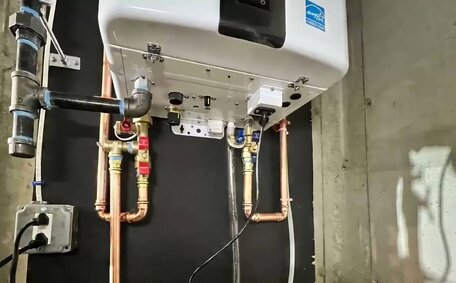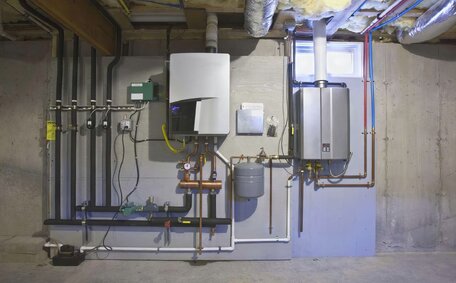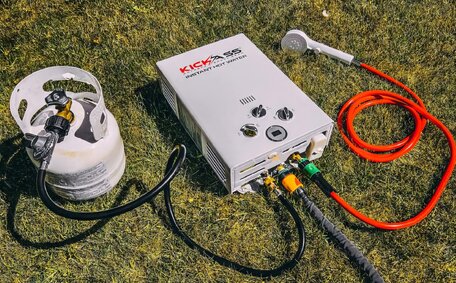Introduction to Gas Pipe Relining
Gas pipe relining Sydney offers is a trenchless pipe repair alternative to traditional sewer line replacement, enhancing your pipeline infrastructure without upheaval. It entails inserting a resin liner into the existing pipe to perform a pipe reline, mending damage and restoring full functionality, a crucial part of relining Sydney’s infrastructure. This able reline method is less invasive than traditional pipe replacement, which requires extensive digging.
For your water and gas pipe relining solutions, consult Croydon Park Plumbing, where we provide services that effectively mend pipes without the need for disruption. To avoid the significant property damage linked with traditional methods, find out more about the benefits of relining instead of excavating your gas main lines. It is more cost-effective than pipe replacement, protecting the lifespan of the pipes your home or business relies on at a fraction of the cost.
Ensuring your plumbing gas network remains safe and functional is paramount, particularly in sidestepping scenarios that lead to complications compromising safety. At Croydon Park Plumbing, we tackle every pipe problem, including broken damaged pipes, with haste to avert potential hazards. With the capacity to reinforce from within, gas pipe relining also furnishes multiple advantages, facilitating rapid and efficient repair – we can reline quickly while conserving architectural aesthetics and landscaping.
Signs Your Gas Pipes May Need Repair
There are several warning signs that your gas pipes may necessitate our professional pipe relining services:
Unusual Odours
If odd gas smells are present in or around your home, especially near gas appliances, I know you’ll understand, It’s clear evidence that it indicates a potential leak. I know that gas leaks are extremely hazardous and should be addressed immediately by a licenced professional.
Hissing Noises
Should you detect hissing sounds emanating from the gas lines, it could indicate broken damaged infrastructure, a situation that underscores the necessity for immediate inspection. Strange noises are never normal and require urgent inspection.
Flickering Flames
If the flames on your gas stove or heater appear abnormal, such as flickering lower or higher than usual, this suggests an issue with gas flow and pressure. Have your lines checked to determine how can pinpoint the problem area.
Slow Appliances
If you’re experiencing slow appliance performance, evidenced by extended warm-up times for hot water systems or reduced stove burner power, it could signal broken pipes and motivate you to get your system evaluated for gas flow impediments. A build-up of water pipe corrosion can relined areas be blamed, is likely preventing adequate gas flow.
Neglecting any of these warning signs can compromise your plumbing gas network, but to discover how to secure your property’s safety, keep reading. Upon observing concerning signs with your plumbing system, we help ensure safety by offering astute gas pipe assessments and specialised relining services at Croydon Park Plumbing. Our adept team can diagnose issues and execute prompt repairs so your pipe can resume optimal function to prevent potential disasters.
Pipe Relining vs Traditional Pipe Replacement
When you realise your pipes need solutions for impaired gas lines, pipe relining offers a less invasive and more cost-effective alternative to complete replacement.
Pipe Replacement Drawbacks
To replace them, plumbers must dig up your areas to access and remove the entire system, but with trenchless techniques, existing pipes can often be saved. This replacement process, safeguarding your piping from damaged pipes without relying on destruction, involves:
- Demolishing driveways, landscaping, floors, and walls
- Lengthy construction causing property access issues
- Significant expense with an average cost of $2,000-5,000
Benefits of Pipe Relining
To avoid digging up your garden or driveway, pipe relining offers a calculated, state-of-the-art method implemented by Croydon Park Plumbing through a single point. The benefits pipe relining presents, which include less property damage and greater cost savings, more than justify the choice:
- Little to no destruction to structures or your garden
- Much faster process taking just 1-3 days
- More affordable at only $400-1,200 on average
- Fifty years plus lifespan for relined pipes
Opting for minimally invasive relining solutions, you save time and money, without the worry about disruption your Croydon Park property might endure.
Understanding the CIPP Relining Process
Cured-in-place pipe (CIPP) relining excels at refurbishing the original pipe infrastructure, making it perfect for revitalising impaired sewer and gas systems. It operates so effectively that the need for extensive excavations is no longer a concern, positioning a resin-saturated felt tube inside the damaged section and hardening it internally.
The CIPP process, featuring a pipe relining technique via a keyhole access point for minimal intrusion, involves:
- A camera inspection to determine the pipe condition and prepare measurements.
- Felt lining that has been pre-soaked with epoxy resin is sized and winched into the pipe inside the area to address through an access point.
- The liner adheres to the internal walls, reviving any area pipe with the application of heat, pressure, steam, UV light, or air to solidify the resin.
- Once set, the CIPP ensures a joint-free, continuous pipe within your old system, replacing the old one with effectiveness and structural soundness.
To uncover whether CIPP lining is worth your investment, consider its ability to reline pipes within your gas and sewer frameworks across various materials. Its adept capacity to capably address bends and rectify discrete sections, ensuring there no wide-scale disruption, is especially noteworthy. The process results in minimal property damage, making extensive excavation a thing past, and takes just 1-2 days with little downtime.
We always offer expertly administered robust CIPP remedies across Croydon Park and the greater Sydney Inner West at Croydon Park Plumbing. We return your pipes to a stable, long-lasting condition so you can keep enjoying safe and reliable gas supply.
Understanding the SIPP Relining Process
Sprayed-In-Place Pipe (SIPP) relining can remedy pipes that are blocked or impaired, serving as a trenchless pipe repair strategy that revitalises them internally. Simply give us a call at Croydon Park Plumbing, and our skilled technicians will promptly reline and rejuvenate your pipes, maintaining functionality and structure with minor upheaval.
How SIPP Relining Works
The SIPP process involves:
- Inspecting the pipe with a camera to determine damage and prepare measurements.
- Cleaning the interior via high-pressure water jetting.
- Applying a two-part epoxy resin directly onto pipe walls, then curing it rapidly with hot compressed air.
- The resin forms a rigid, jointless line which can be relined inside the pipe then seals cracks and holes.
With SIPP, there’s no issue in compatibility; it suits drain pipes made from materials like iron, steel, and PVC. The resin bonds effectively within 2-3 hours, so the section pipe within your gas service can be restored promptly. This method showcases how easily a section of pipe can relined without disturbing large areas.
Benefits of SIPP Relining
Key advantages of SIPP pipe relining include:
- Much less property damage than traditional replacement
- Rapid process taking only hours instead of days
- More cost-effective, saving money on labour and restoration
- 50+ year lifecycle for the relined pipe
At Croydon Park Plumbing, our advanced SIPP pipe relining solution offers a swift, non-destructive overhaul, reinstating robust and secure sewer and gas lines, mitigating any risk.
Choosing the Right Relining Method for Your Needs
Determining the apt types pipe relining for your gas system necessitates a thorough assessment of the setup, positioning, and state of your network. Our expert assessors at Croydon Park Plumbing have carried out extensive examinations to determine the more about appropriate pipe relining technique, be it CIPP or SIPP, for your specific circumstances.
Key Factors in Choosing Relining Methods
Weighing up the pros cons of CIPP versus SIPP for your gas pipe relining needs requires consideration of several factors:
- Accessibility – CIPP may work better for pipes in harder to reach spots, while SIPP suits more accessible sections
- Pipe material – Both methods work for various materials. CIPP is excellently suited for diverse materials including old pipes made from cast iron, concrete, and PVC. SIPP is effective for iron, steel and PVC.
- Bends and configuration – CIPP can navigate around bends and elbows, whereas SIPP works best for straight sections
- Pipe length – CIPP tends to service longer stretches, while SIPP repairs more isolated, shorter segments
- Curing time – SIPP cures rapidly within 2-3 hours, while CIPP takes 1-2 days
A comprehensive site assessment reveals critical information for your pipe relining, such as points of damage, entry locations, and plumbing configurations among other essentials. From here, Our Croydon Park plumbers recommend the pipe relining which best suits your system’s specific needs.
Reliable Gas Pipe Renovation
We always provide expert evaluations; make your booking for a customised relining project with Croydon Park Plumbing to solidify the effectiveness and endurance of your natural gas system, and to find out more, just reach out. Reach out to us now to discover how we can devise the perfect relining strategy for the pipelines in your Croydon Park home.
Aftercare and Maintenance of Relined Pipes
It’s vital to make sure you properly maintain your pipes after relining to maximise their longevity and performance. Here are some tips from Croydon Park Plumbing for getting the most out of your investment:
Conduct Regular Inspections
It’s crucial to arrange biennial evaluations by your plumber, focusing on relining your system, to detect pipe leaks and maintain optimal functionality. They can perform leak detection, check for corrosion, blockages, and other issues using pipe camera technology before problems escalate.
Avoid Aggressive Chemicals
Refrain from pouring corrosive cleaners, paint thinners, gasoline, and other harsh chemicals down your drain pipe to avoid actions that could damage your relined pipes. Only use drain-safe commercial cleaners to avoid damaging the epoxy liner.
Clear Small Blockages Quickly
Promptly addressing the initial signs of a clog, which can precipitate a blocked drain, by using a plunger or drain snake ensures a continuous waste flow. Allowing blockages to accumulate strains your pipes.
Repair Damage Promptly
Addressing any damages, such as a leaking pipe or functionality problems, without delay means we can repair your piping issues swiftly. Our Croydon Park plumbers are on hand around the clock to perform pipe repairs and relining services should any issues arise.
At Croydon Park Plumbing, we always recommend proactivity with routine checks to ensure your relined pipes remain in prime condition. Catching minor issues early prevents more serious pipe failures down the track. Speak with us today and engage in a discussion with our dedicated team at Croydon Park Plumbing about custom aftercare for your freshly improved system.
FAQs About Gas Pipe Relining
Is gas pipe relining safe?
Rest easy knowing that we would stand by the safety of gas pipe relining conducted by our accredited specialists at Croydon Park Plumbing. We would employ technicians using pipe patching techniques and industry-approved materials that meet all safety codes and standards.
How long does the relining process take?
You can get your gas pipe relining undertaken promptly at any time of day, with the entire process typically concluding within a span of 1-3 days. Our tailored response allows you to swiftly rectify issues and use them again, minimising downtime to quickly restore your gas service.
What does pipe relining cost?
Exact relining costs depend on the pipe size, length and damage level, but typically range from $400 - $1,200. This is far less than the $2,000 - $5,000 cost of full pipe replacement.
What materials are used to reline pipes?
We use either epoxy resin-soaked felt for CIPP relining, or liquid epoxy resins for SIPP relining. Both methods yield unwavering, smooth liners that are stronger than the pipe your household depends on, outperforming the original materials and securing sustained operation for lengthened periods.
Is relining suitable if tree roots caused pipe damage?
Indeed, our pipe relining can contain aggressive tree root invasions, effectively sealing any cracks and voids they have caused, thereby halting further damage and root ingress.






